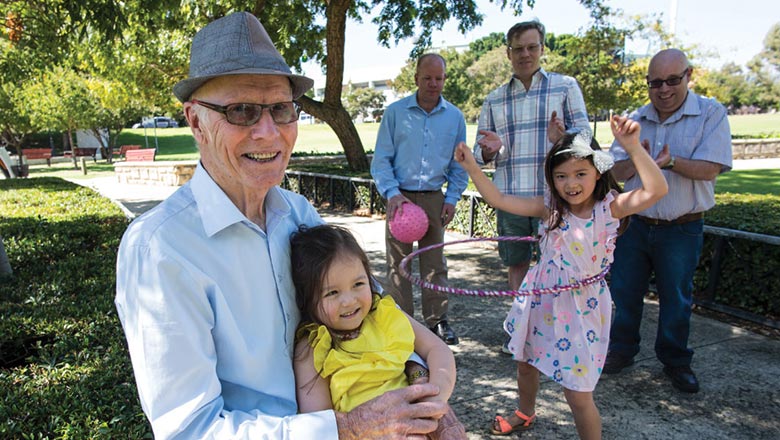
Odds are, you've never heard of Geoff Cattach. He's not unhappy about that. Yet for the past 30 years, Geoff has headed the Children's Leukaemia and Cancer Research Foundation (CLCRF), an organisation that has raised over $20 million to fund The Kids' research into childhood cancers. And, in turn, has helped to create a highly respected children's cancer research centre in WA.
For the Harvey businessman and his wife Marie, this battle is very personal. Two of their three sons have survived cancer. Brent was diagnosed with acute lymphoblastic leukaemia two days before his third birthday. Stewart suffered a brain tumour at age 13. At 31, he was given just six weeks to live when a second tumour was detected.Over a decade later, Stewart is still here - happy, well and working in the CLCRF Laboratory at The Kids.Still, as a dad, Geoff remembers too well the helplessness of sitting beside a sick son's bed, unable to offer anything but fierce love. In the 1970's, when Brent was first diagnosed, his prognosis was poor. "It was pretty awful," says Geoff. "I suppose you never give up hope, but only 30 per cent of children with leukaemia survived back then."
If Geoff the father was helpless, Geoff the businessman was not. As an AMP Financial Planner, he had a strong network of connections - people he trusted and who trusted him. They were all accustomed to doing business on a hand-shake, where your word was your bond.
Along with Peter Harper, a dad who had promised his dying daughter Jennifer that he would raise funds for research, the Children's Leukaemia and Cancer Research Foundation was established and fundraising began. Within two years they had $100,000 and were poised to commence sponsoring research.
On the suggestion of Professor Keven Turner, a prominent specialist at Princess Margaret Hospital, they recruited Professor Ursula Kees, a Swiss researcher who had been working at a major cancer facility in Germany.
"He was the guy who conned her, so to speak, to come to Australia," jokes Geoff. "I'm sure Ursula wouldn't have come if she had realised we only had a hundred grand in the bank!"
As fundraising continued, so did young Brent Cattach's treatment. Aged seven, his condition deteriorated dramatically. "He was diagnosed as clinically dead, no pulse, blood pressure down," says Geoff.
Doctors never left Brent, neither did his family. He rallied. On Christmas Eve 1984, Dr Michael Willoughby, the head of Oncology at Princess Margaret Hospital asked the Cattachs for permission to do a bone-marrow transplant on their little boy, using marrow from their middle son, David.
"He said if we don't go now, we may never get this chance again," remembers Geoff. "My son wouldn't be alive today, if he hadn't," says Geoff Cattach quietly. "So we've been paid back."
In a curious twist, the chance to work with Dr Willoughby and doctors at PMH had been a major factor luring Ursula Kees to Perth. "This collaboration was absolutely unique," she says,"and was the important foundation for the ensuing collaboration between the clinicians at the hospital who treat these young patients and us on the research side."
Indeed, since 1990, Professor Kees and her team at The Kids have made some significant advances. They established Australia's first paediatric tumour bank. They also have on-going projects around a particularly aggressive cancer called NUT midline carcinoma. As well, they're using modern technologies to map genetic changes leading to cancers.
Geoff Cattach is heartened that such important work is being done in Perth. "Why am I so pleased? I suppose it's because I'm a bit parochial," he admits. "I think, 'why shouldn't it be here in Perth?'" "You're raising funds for people in Perth. Our children are sick here. And we've got all the research facilities and intellectual firepower here to help them."
"Today, if you've got a child with leukaemia, then there's a 90 per cent chance of survival," he says. "So much progress has been made." But there are other childhood cancers - rarer types of leukaemia, brain tumours - where the deck is still stacked against these children. Our foundation is here for the long-term. It's built for the future and we won't rest until the best cures, treatments and preventions are found. It's a real privilege for us to be participating in such an important cause."
Want to help The Kids create a healthier future for children? People like you make all the difference. Join us by making a donation, fundraising, becoming a corporate sponsor, or making a bequest.
